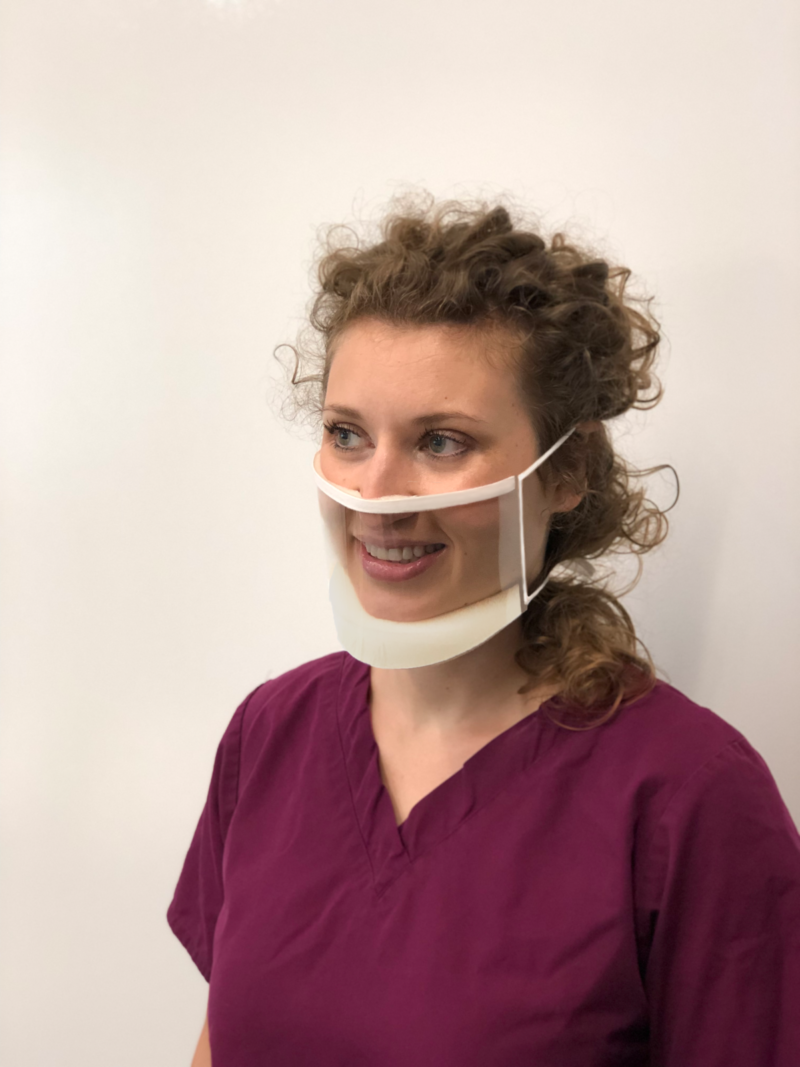When a team of Johns Hopkins grad students and alumni began building ClearMask in late 2017, they saw the need for a face mask that was transparent.
Cofounder Allysa Dittmar, who is deaf, had been left isolated and unable to communicate before a medical procedure, when she couldn’t understand the medical pros talking behind their masks.
So it was apparent to the team then that a mask that allowed folks to see faces could help deaf and hard of hearing individuals read lips and see faces. And the team also talked about how it could help many groups of patients.
So they set out to bring a mask to market. The startup took part in Baltimore accelerators, like Johns Hopkins’ Social Innovation Lab and ETC’s AccelerateBaltimore, which offered guidance as well as some funding. Moving through R&D to testing the product in the loop of feedback and adjustment in which so many startups partake, it set out on a pathway to regulatory clearance, with human studies continuing through last fall.
In April, the company received clearance as a medical device from the U.S. Food and Drug Administration.
It’s a crucial milestone. But by that time, the company was already in the throes of ramping up for its next phase. A few weeks before regulatory approval was granted, the COVID-19 pandemic arrived in the U.S. Seemingly overnight, masks were at the front of the conversation. The value of having a face covering that still showed a face was recognized not just for the deaf and hard of hearing in medical facilities, but also for older patients and children. It has also shipped orders to other kinds of settings like retail, restaurants and schools. Suddenly, the benefits of the mask — the ability to more clearly understand what folks are saying and pick up more readily on nonverbal cues — became relevant for everyone.
“Being able to see people and connect with other people is important to help reduce that loneliness and stress,” CEO Aaron Hsu said.
With approval in place that allows a product to be marketed, companies typically begin a transition from a phase of building to production. But like so much of the world in the spring, ClearMask had to change fast.
“We had to do it a lot faster than we expected,” Hsu said of the transition. “It was a balancing act of making sure we fulfilled the user’s need, but making sure that we could make as many as possible.”
With everyone wearing masks, it also brought additional feedback to incorporate: Instead of the looped earholes that were proving to be a literal pain point for some, the team shifted to an “EZ Adjuster” for more comfort, Hsu said. And making the mask as transparent as possible brought another time to think outside the box, Hsu said, resulting in a mask with an “anti-fog” feature.
As far as the production itself, a foundation of local partners helped the company move quickly, Hsu said. The company built relationships with Gaithersburg-based Xometry on manufacturing and design and Locust Point-based Shapiro for shipping and logistics, so the team could put those partnerships to work. It reflects the company’s model of maintaining a team of 16 people for all of the corporate and operations functions, then working with other companies that make and ship the product.
The company also raised $300,000 from Maryland tech agency TEDCO as it looked to build inventory to fill the preorders, with the money wired in short order once the company made a case, showing a wider buy in from the community that the team has seen along the way.
“The amount of support we’ve been offered without having to ask for it has been phenomenal,” Hsu said.
It added up to the company selling millions of masks in the last few months. Initially, they sold in bulk. Now, it is also offering a consumer version that’s available in boxes of two-dozen.
The interest has also spread. After the team worked quickly to get a sample to Manhattan on a day’s notice, Hoda Kotb tried one on during NBC’s “Today Show,” and NPR talking about the rise in demand for see-through masks as it became apparent that the pandemic would remain.
Alabama football coach Nick Saban was also photographed wearing a mask that looked very familiar.
With a product reaching customers in need during the pandemic, fulfillment is coming from lots of sides these days. But it still takes a lot of work. Hsu said the team continues to put in long hours, even as it sees its name in lights.
“We all are working a tremendous amount to continue getting these masks out,” he said. “It’s both amazing and grueling at the same time.”
With all the attention and the product that seems to fit the moment, it can seem like a bit of an overnight success. But in talking to Hsu, it’s clear that everything that happened in these last several months was the product of work over the last several years.
“The past few years have set a solid foundation for us to skyrocket,” Hsu said.







